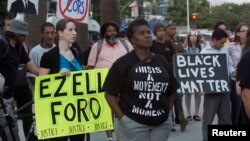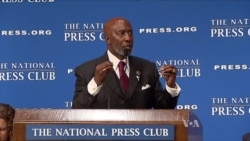Increasingly, when there are protests against U.S. racial injustice, like in Ferguson, Missouri, and at political rallies like the one for Democratic presidential candidate Bernie Sanders that was halted in Seattle on Saturday, they are associated with the group Black Lives Matter.
Black Lives Matter is a young grass-roots activist movement that began in July 2013 after the shooting of unarmed black teenager Trayvon Martin by neighborhood watch volunteer George Zimmerman.
The movement gathered momentum and visibility the next year when unarmed teenager Michael Brown was shot by a white policeman after a street confrontation in Ferguson. Black Lives Matter is very much on the scene in Ferguson now as the anniversary of that shooting death is marked.
“Not a moment, but a movement,” says the group’s website, which does little to explain its philosophy for many Americans, who are just getting used to hearing the group’s name.
“We embrace a diversity of tactics,” says the Black Lives Matter website. “We are a decentralized network aiming to build the leadership and power of black people.”
Deep frustration
“Right now, we’re playing catchup,” said the Reverend John Richard Bryant, who was asked about Black Lives Matter during a speech in Washington, D.C., Wednesday.
Bryant, 72, who is black, said about the young protesters, “The way they respond may not be the way we responded years ago — nonviolence — we’ve got to catch up to that.” He added that when incidents of racial injustice are captured on cellphone cameras, the result is a “deep, deep feeling of frustration in the souls of people who feel that in this culture, in this society, their lives don’t matter.”
Watch Reverend Bryant speak at the National Press Club
Bryant is senior bishop of the Fourth Episcopal District of the African Methodist Episcopal Church. An AME church in Charleston, South Carolina, was the scene of a mass shooting in June in which nine black people died. A white man has been charged in the attack.
Bryant may think he is catching up to Black Lives Matter, but he said he is in complete sympathy with the movement. He said racism is eating away at the fiber of the U.S., and that white America views black America as menacing.
“The man who killed Michael Brown said he looked like a monster, and the grand jury agreed. … It’s a challenge to law enforcement, prosecutors when they see a black differently than they see a white,” he said.
American stew
Bryant also cited a lack of understanding on the part of politicians and others who try to turn Black Lives Matter into something more inclusive.
“They act as if black lives don’t matter," he said. "I resent it when I say black lives matter and people respond all lives matter. I ain’t talking about all lives.”
Bryant likens American society, often referred to as a melting pot, to a stew. In a stew, he said, the carrots are separate from the potatoes and from the greens. They all contribute to the dish, but they are all different.






